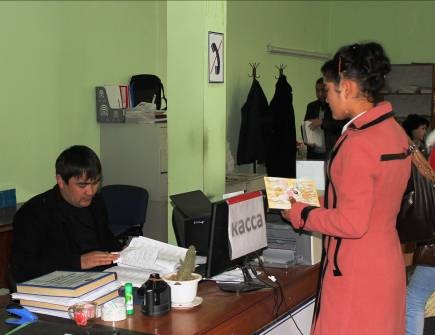
May 2015—Many citizens of the Kyrgyz Republic lack basic legal knowledge, which is especially acute in remote areas with few lawyers or legal services. As a result, citizens face a variety of challenges that range from registering their land and property rights to receiving basic identity documents such as passports and birth certificates.
In some families, this problem has been passed from generation to generation: If parents do not have passports, they cannot obtain birth certificates for their children, who later cannot receive passports of their own.
Another common issue is that many residents lack official citizenship because they still have Soviet Union passports, which are no longer valid. Without Kyrgyz passports, they cannot access important basic services, receive state benefits or travel outside the country.
USAID’s Local Transparency and Cooperation Initiative (LTCI) addressed this problem in 2012 by establishing a network of free legal clinics in the 13 districts of Jalal Abad and Naryn regions of the Kyrgyz Republic. The lawyers help people collect all necessary documents and certificates; prepare applications and petitions; and conduct group seminars on various issues relating to different state and municipal services.
The three-year program, which ran from 2012 through 2014, organized over 800 activities—including trainings, public hearings and meetings—and provided consultations to over 7,000 residents, including over 2,000 women, to improve service delivery.
Over the course of the program, more than 700 birth certificates and passports were issued and hundreds of people received consultations on obtaining citizenship.
A local resident of Bazar-Korgon district, who moved to the Kyrgyz Republic with his family in 2003, said he could not obtain Kyrgyz citizenship because the paperwork was too complicated and he could not get through the bureaucracy by himself. “We have children, but without a passport, we could not get birth certificates for them. It was also difficult to enroll our children in school. The LTCI lawyers supported our family in the process of receiving these documents. Now we finally feel that we are real citizens of the Kyrgyz Republic,” he said.
In addition to making life easier for many citizens, the project increased the population’s knowledge of legal issues.
“People became more aware of their rights, of ways to solve their problems in a legal way,” said Mairambek Zhumaev, one of the project lawyers. “Legal literacy of the population increases and the people begin to help each other.”
LINKS







Comment
Make a general inquiry or suggest an improvement.